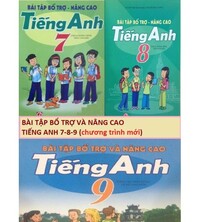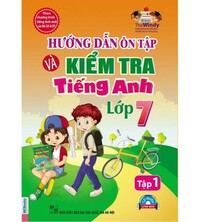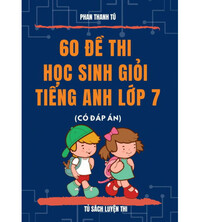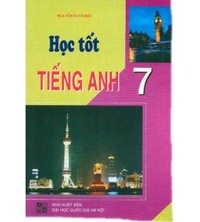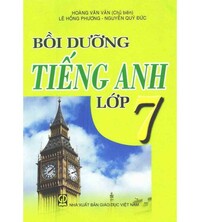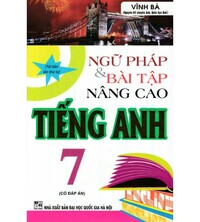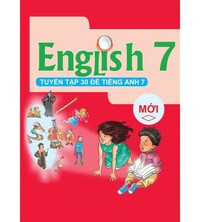Đề thi giữa kì 2 Tiếng Anh 7 Global Success - Đề số 5
I. Choose a word that has different sound in the underlined part. II. Choose the word with a different stress pattern. III. Choose the best answer. IV. Give the correct form of each word in the brackets. V. Complete each of the following sentences using the cues given. VI. Listen to the conversation between Trung and Alisa. Circle the best answer A, B, or C. VII. Read the passage and choose the best answer to fill in each blank. VIII. Read the passage. Circle the best answer A, B, or C to each
Đề bài
I. Choose a word that has different sound in the underlined part.
1. A. action B. scary C. romantic D. animation
2. A. fly B. crazy C. story D. comedy
3. A. professor B. lorry C. horror D. actor
II. Choose the word with a different stress pattern.
4. A. locate B. culture C. omelette D. harvest
5. A. horror B. perform C. cannon D. greasy
III. Choose the best answer.
6. Big cities often _________ from traffic jams every day.
A. cross B. suffer C. start D. come
7. One problem in big cities is that too many people _________ the road.
A. take B. do C. make D. use
8. His father likes watching films that show real life _________ or stories.
A. events B. projects C. programs D. actions
9. The girl was so _________ by the film that she couldn’t sleep last night.
A. bored B. annoyed C. disappointed D. frightened
10. We are all _________ that he became the champion of the competition.
A. interested B. surprised C. terrified D. worried
11. How do you feel when you watch a _________ film?
A. lazy B. hard-working C. gripping D. careful
12. Although the story of the film was good, I didn’t like the _________.
A. script B. director C. acting D. color
13. My daughter _________ a lot of money on her clothes but she is not satisfied.
A. has B. takes C. learns D. spends
14. I can’t hear anything because the _________ is terrible.
A. sound B. color C. electricity D. light
15. A lot of dancers go to Rio de Janeiro to _________ the Rio Carnival.
A. attend B. take C. happen D. play
IV. Give the correct form of each word in the brackets.
16. Bells are designed to wake the __________ motorists. (SLEEP)
17. There are many __________ who sell and buy things on the road every morning. (VILLAGE)
18. The film is about adventures in the __________ land in America. (MAGIC)
19. The film they saw yesterday was __________ by a famous man. (DIRECT)
20. Jack chose the festival because he would like to see elephants _________. (RACE)
V. Complete each of the following sentences using the cues given.
21. Animated character/ can/ animal/ tree/ or/ any household items,/ and/ they/ can/ talk/ like/ human being.
=> ________________________________________________________
22. I/ enjoy/ watch/ film/ made/famous/ Hollywood film producers.
=> ________________________________________________________
23. My favourite/ type/ movie/ comedy/ because/ it/ could/ make/ me/ laugh/ de-stress/ after/ long/ busy day.
=> ________________________________________________________
24. Original name/ worldwide famous/ Mickey Mouse/Mortimer Mouse.
=> ________________________________________________________
25. Some people/ interested/ horror movie/ because/ they/ want/ experience/ complex/ extreme emotions.
=> ________________________________________________________
VI. Listen to the conversation between Trung and Alisa. Circle the best answer A, B, or C.
26. When did Alisa begin living in Ho Chi Minh City?
A. About four weeks ago.
B. About 6 months ago.
C. About one year ago.
27. How does Alisa feel when crossing the streets in the rush hour?
A. Hot and tired.
B. Unsafe.
C. Angry.
28. What does Trung think about the traffic jams there?
A. Complicated.
B. Dangerous.
C. Unbelievable.
29. Why does she feel uncomfortable in the rainy season?
A. She sometimes gets wet while waiting at the bus stop.
B. She cycles to school in the rain, and she’s late for class.
C. The traffic jams are so heavy that she can’t take the bus in the rain.
30. What idea does Alisa suggest to solve the traffic problems?
A. Limiting the cars running at rush hour.
B. Using bikes instead of cars.
C. Building a modern underground system.
VII. Read the passage and choose the best answer to fill in each blank.
Diwali is one of the biggest and most important festivals in India. It usually (31) ________ between October and November. Nowadays this festival is celebrated by both Hindu and non-Hindu communities (32) ________ lasts for about five days. During the time of festival, Indians clean their houses and buy gold or kitchen utensils to help bring good luck. Then, they decorate their homes with clay lamps, which are (33) ________ symbol of the inner light protecting from spiritual darkness.
(34) _________ the busy days of preparation, family members gather together for prayers to their own goddess, delicious feasts and colourful fireworks displays. They also visit their friends and relatives and (35) ________ each other many gifts and best wishes.
31. A. celebrates B. happens C. organises D. holds
32. A. but B. or C. and D. as
33. A. the B. a C. an D. x
34. A. During B. Before C. After D. On
35. A. give B. get C. take D. change
VIII. Read the passage. Circle the best answer A, B, or C to each of the questions.
Harry Potter and the Chamber of Secrets is the second of the fantasy film series based on the same novel by J. K. Rowling. After the success of the first one, Chris Columbus is still the director of this film. Meanwhile, the main cast of the first film remains in the second one. The film tells the story about the great efforts of Harry to save his friends at Hogwarts, especially Ron’s sister Ginny, from the attacks of a basilisk. It’s a giant snake under the control of the ghostly memory of the sixteen-year-old Tom Riddle, one piece of Lord Voldemort’s soul preserved in an enchanted diary. In the end, he kills the basilisk, saves everybody and frees Dobby – a kind of house-elf. The film is a really must-see. It also has lost of gripping images, soundtracks and visual effects.
36. What is the passage mainly about?
A. A famous director with his successful fantasy film.
B. A young wizard who kills a monster in his magic school.
C. A film based on the second novel of a fantasy series by J. K. Rowling.
37. Who is the author of the book series?
A. Chris Columbus.
B. J. K. Rowling.
C. Harry Potter.
38. Which of the following statements about Harry is true?
A. He fights against a cruel house-elf of Lord Voldemort.
B. He kills a giant spider at the end of the film.
C. He saves Ron’s sister from a basilisk.
39. What does the word “It” in line 8 mean?
A. The film.
B. The kind house-elf.
C. The basilisk.
40. How are the visual effects of the film?
A. Extremely interesting.
B. Rather boring.
C. Very colourful.
---------------------THE END---------------------
Đáp án
HƯỚNG DẪN GIẢI
Thực hiện: Ban chuyên môn

21. Animated character can be animals, trees, or any household items, and they can talk like human being.
22. I enjoy watching films which are made by famous Hollywood film producers.
23. My favourite type of movie is comedy because it could make me laugh and de-stress after long busy days.
24. Original name of worldwide famous Mickey Mouse was Mortimer Mouse.
25. Some people are interested in horror movie because they want to experience complex extreme emotions.
HƯỚNG DẪN GIẢI CHI TIẾT
1. B
Kiến thức: Phát âm “a”
Giải thích:
A. action /ˈæk.ʃən/
B. scary /ˈskeə.ri/
C. romantic /rəʊˈmæn.tɪk/
D. animation /ˌæn.ɪˈmeɪ.ʃən/
Phần được gạch chân ở phương án B được phát âm /eə/, các phương án còn lại phát âm /æ/
Chọn B
2. A
Kiến thức: Phát âm “y”
Giải thích:
A. fly /flaɪ/
B. crazy /ˈkreɪ.zi/
C. story /ˈstɔː.ri/
D. comedy /ˈkɒm.ə.di/
Phần được gạch chân ở phương án A được phát âm /ai/, các phương án còn lại phát âm /ɪ/
Chọn A
3. B
Kiến thức: Phát âm “or”
Giải thích:
A. professor /prəˈfes.ər/
B. lorry /ˈlɒr.i/
C. horror /ˈhɒr.ər/
D. actor /ˈæk.tər/
Phần được gạch chân ở phương án B được phát âm /ɒr/, các phương án còn lại phát âm /ər/
Chọn B
4. A
Kiến thức: Trọng âm
Giải thích:
A. locate /ləʊˈkeɪt/
B. culture /ˈkʌl.tʃər/
C. omelette /ˈɒm.lət/
D. harvest /ˈhɑː.vɪst/
Phương án A có trọng âm 2, các phương án còn lại có trọng âm 1.
Chọn A
5. B
Kiến thức: Trọng âm
Giải thích:
A. horror /ˈhɒr.ər/
B. perform /pəˈfɔːm/
C. cannon /ˈkæn.ən/
D. greasy /ˈɡriː.si/
Phương án B có trọng âm 2, các phương án còn lại có trọng âm 1.
Chọn B
6. B
Kiến thức: Từ vựng
Giải thích:
A. cross (v): băng qua
B. suffer (v): chịu đựng
C. start (v): bắt đầu
D. come (v): đến
Cụm động từ: “suffer from”: chịu đựng
Big cities often suffer from traffic jams every day.
(Các thành phố lớn thường xuyên phải chịu đựng việc tắc đường hàng ngày.)
Chọn B
7. D
Kiến thức: Từ vựng
Giải thích:
A. take (v): lấy
B. do (v): làm
C. make (v): làm
D. use (v): dùng
One problem in big cities is that too many people use the road.
(Một vấn đề ở các thành phố lớn là có quá nhiều người sử dụng đường bộ.)
Chọn D
8. A
Kiến thức: Từ vựng
Giải thích:
A. events (n): sự kiện
B. projects (n): dự án
C. programs (n): chương trình
D. actions (n): hành động
His father likes watching films that show real life events or stories.
(Cha của anh ấy thích xem những bộ phim chiếu các sự kiện hoặc câu chuyện có thật trong đời sống.)
Chọn A
9. D
Kiến thức: Từ vựng
Giải thích:
A. bored (a): chán
B. annoyed (a): bực bội
C. disappointed (a): thất vọng
D. frightened (v): hoảng sợ
The girl was so frightened by the film that she couldn’t sleep last night.
(Cô gái đã rất sợ hãi bởi bộ phim nên cô ấy không thể ngủ đêm qua.)
Chọn D
10. B
Kiến thức: Từ vựng
Giải thích:
A. interested (a): hứng thú
B. surprised (a): bất ngờ
C. terrified (a): sợ hãi
D. worried (a): lo lắng
We are all surprised that he became the champion of the competition.
(Tất cả chúng tôi đều ngạc nhiên khi anh ấy trở thành nhà vô địch của cuộc thi.)
Chọn B
11. C
Kiến thức: Từ vựng
Giải thích:
A. lazy (a): lười
B. hard-working (a): chăm chỉ
C. gripping (a): hấp dẫn
D. careful (a): cẩn thận
How do you feel when you watch a gripping film?
(Bạn cảm thấy thế nào khi xem một bộ phim hấp dẫn?)
Chọn C
12. C
Kiến thức: Từ vựng
Giải thích:
A. script (a): kịch bản
B. director (n): đạo diễn
C. acting (n): diễn xuất
D. color (n): màu sắc
Although the story of the film was good, I didn’t like the acting.
(Mặc dù câu chuyện của bộ phim rất hay nhưng tôi không thích diễn xuất.)
Chọn C
13. D
Kiến thức: Từ vựng
Giải thích:
A. has (v): có
B. takes (v): lấy
C. learns (v): học
D. spends (v): dành ra
My daughter spends a lot of money on her clothes but she is not satisfied.
(Con gái tôi tiêu rất nhiều tiền vào quần áo nhưng nó không hài lòng.)
Chọn D
14. A
Kiến thức: Từ vựng
Giải thích:
A. sound (n): âm thanh
B. color (n): màu sắc
C. electricity (n): điện
D. light (n): ánh sáng
I can’t hear anything because the sound is terrible.
(Tôi không thể nghe thấy bất cứ điều gì bởi vì âm thanh thì tệ.)
Chọn A
15. A
Kiến thức: Từ vựng
Giải thích:
A. attend (v): tham dự
B. take (v): lấy
C. happen (v): xảy ra
D. play (v): chơi
lot of dancers go to Rio de Janeiro to attend the Rio Carnival.
(rất nhiều vũ công đến Rio de Janeiro để tham dự Lễ hội hóa trang Rio.)
Chọn A
16. sleepy
Kiến thức: Từ vựng – Từ loại
Giải thích:
Trước danh từ “motorists” (người lái xe) cần một tính từ
sleep (v): ngủ
=> sleepy (a): buồn ngủ
Bells are designed to wake the sleepy motorists.
(Kèn được thiết kế để đánh thức những người lái xe đang buồn ngủ.)
Đáp án: sleepy
17. villagers
Kiến thức: Từ vựng – Từ loại
Giải thích:
Sau lượng từ “many” (nhiều) cần một danh từ đếm được số nhiều
village (n): làng
=> villager (n): dân làng
There are many villagers who sell and buy things on the road every morning.
(Có rất nhiều người dân làng bán và mua những thứ trên đường vào mỗi buổi sáng.)
Đáp án: villagers
18. magical
Kiến thức: Từ vựng – Từ loại
Giải thích:
Trước danh từ “land” (vùng đất) cần một tính từ.
magic (n): kì diệu
=> magical (a): huyền diệu
The film is about adventures in the magical land in America.
(Phim kể về những cuộc phiêu lưu tại vùng đất kỳ diệu ở Mỹ.)
Đáp án: magical
19. directed
Kiến thức: Thể bị động
Giải thích:
Dấu hiệu nhận biết “by a famous man” (bởi một người nổi tiếng) => công thức bị động: S + tobe + V3/ed + BY + sb
direct – directed – directed (v): đạo diễn
The film they saw yesterday was directed by a famous man.
(Bộ phim họ xem ngày hôm qua được đạo diễn bởi một người đàn ông nổi tiếng.)
Đáp án: directed
20. racing
Kiến thức: Từ vựng – Từ loại
Giải thích:
Sau danh từ “elephants” (voi) cần một danh từ để tạo nên danh từ ghép
race (v): đua
=> racing (n): cuộc đua
Jack chose the festival because he would like to see elephants racing.
(Jack đã chọn lễ hội vì anh ấy muốn xem những chú voi đua.)
Đáp án: racing
21.
Kiến thức: Viết câu thì hiện tại đơn
Giải thích:
- Thì hiện tại đơn diễn tả một thật hiển nhiên có ở hiện tại.
- can + V (nguyên thể): có thể
Đáp án: Animated character can be animals, trees, or any household items, and they can talk like human being.
(Nhân vật hoạt hình có thể là động vật, cây cối hay bất kỳ vật dụng nào trong nhà và chúng có thể nói chuyện như con người.)
22.
Kiến thức: Viết câu bị động
Giải thích:
- Sau động từ “enjoy” (thích) cần một động từ ở dạng V-ing.
- Công thức bị động ở thì hiện tại đơn với chủ ngữ số nhiều: S + are + V3/ed + By sb
Đáp án: I enjoy watching films which are made by famous Hollywood film producers.
(Tôi thích xem những bộ phim được thực hiện bởi những nhà sản xuất phim nổi tiếng của Hollywood.)
23.
Kiến thức: Viết câu thì hienejt ại đơn
Giải thích:
- Thì hiện tại đơn diễn tả một thói quen, sở thích.
- type of…: thể loại…
could + V (nguyên thể): có thể
make + O + V (nguyên thể): khiến cho ai đó…
Đáp án: My favourite type of movie is comedy because it could make me laugh and de-stress after long busy days.
(Thể loại phim yêu thích của tôi là hài vì nó có thể làm tôi cười và giảm căng thẳng sau những ngày dài bận rộn)
24.
Kiến thức: Viết câu thì quá khứ đơn
Giải thích:
Thì quá khứ đơn diễn tả một việc đã xảy ra và kết thúc trong quá khứ.
Công thức thì quá khứ đơn ở dạng khẳng định chủ ngữ số ít với động từ “tobe”: S + was…”
Đáp án: Original name of worldwide famous Mickey Mouse was Mortimer Mouse.
(Tên ban đầu của chuột Mickey nổi tiếng thế giới là Mortimer Mouse.)
25.
Kiến thức: Viết câu thì hiện tại đơn
Giải thích:
- Thì hiện tại đơn diễn tả một sự thật ở thời điểm hiện tại.
- Cấu trúc thể hiện sự thích thú với chủ ngữ số nhiều ở hiện tại đơn: S + are + interested + in + danh từ.
- want + to V: muốn…
Đáp án: Some people are interested in horror movie because they want to experience complex extreme emotions.
(Một số người quan tâm đến phim kinh dị vì họ muốn trải nghiệm những cảm xúc thật sự phức tạp.)
26. B
Kiến thức: Nghe hiểu
Giải thích:
Alisa bắt đầu sống ở Thành phố Hồ Chí Minh khi nào?
A. Khoảng bốn tuần trước.
B. Cách đây khoảng 6 tháng.
C. Khoảng một năm trước.
Thông tin: “As an exchange student living here for half a year, I’m not used to travelling in the streets.”
(Là một sinh viên trao đổi sống ở đây nửa năm, tôi không quen đi lại trên đường phố.)
Chọn B
27. B
Kiến thức: Nghe hiểu
Giải thích:
Alisa cảm thấy thế nào khi băng qua đường vào giờ cao điểm?
A. Nóng bức và mệt mỏi.
B. Không an toàn.
C. Tức giận.
Thông tin: “I find it dangerous to go cycling or cross the streets in the rush hour.”
(Tôi thấy nguy hiểm khi đi xe đạp hoặc băng qua đường vào giờ cao điểm.)
unsafe (a) = dangerous (a): nguy hiểm
Chọn B
28. A
Kiến thức: Nghe hiểu
Giải thích:
Trung nghĩ sao về tình trạng tắc đường ở đó?
A. Phức tạp.
B. Nguy hiểm.
C. Không thể tin được.
Thông tin: “I also think that traffic congestion here is a complicated problem.”
(Tôi cũng nghĩ rằng tắc nghẽn giao thông ở đây là một vấn đề phức tạp.)
Chọn A
29. A
Kiến thức: Nghe hiểu
Giải thích:
Tại sao cô ấy cảm thấy khó chịu trong mùa mưa?
A. Đôi khi cô ấy bị ướt khi đợi ở trạm xe buýt.
B. Cô ấy đạp xe đến trường dưới trời mưa và cô ấy đến lớp muộn.
C. Tắc đường quá nặng nên cô ấy không thể đi xe buýt dưới trời mưa.
Thông tin: “it’s really uncomfortable to get wet at the bus stop when it rains hard.”
(Thật khó chịu khi bị ướt ở trạm xe buýt khi trời mưa to.)
Chọn A
30. C
Kiến thức: Nghe hiểu
Giải thích:
Alisa gợi ý ý tưởng gì để giải quyết vấn đề giao thông?
A. Hạn chế xe chạy vào giờ cao điểm.
B. Sử dụng xe đạp thay cho ô tô.
C. Xây dựng hệ thống điện ngầm hiện đại.
Thông tin: “I think the city authorities should widen the streets as well as build a modern underground system.”
(Tôi nghĩ chính quyền thành phố nên mở rộng đường phố cũng như xây dựng một hệ thống ngầm hiện đại.)
Chọn C
Bài nghe:
Trung: What do you think about the traffic in Ho Chi Minh City, Alisa?
Alisa: Well, honestly, it has a few problems. As an exchange student living here for half a year, I’m not used to travelling in the streets.
Trung: Could you explain it clearly?
Alisa: You know, there are a huge number of vehicles running so fast every minute, so I find it dangerous to go cycling or cross the streets in the rush hour.
Trung: Yes, I also think that traffic congestion here is a complicated problem, especially in the rainy season.
Alisa: I totally agree. Although I can take a bus to school, it usually takes me a lot of time to wait for it, so it’s really uncomfortable to get wet at the bus stop when it rains hard.
Trung: Oh, I see. Do you have any suggestions to solve this issue?
Alisa: It’s hard to say, but I think the city authorities should widen the streets as well as build a modern underground system.
Trung: Couldn't agree more!
Tạm dịch:
Trung: Bạn nghĩ gì về giao thông ở Thành phố Hồ Chí Minh, Alisa?
Alisa: Chà, thành thật mà nói, nó có một vài vấn đề. Là một sinh viên trao đổi sống ở đây nửa năm, tôi không quen đi lại trên đường phố.
Trung: Bạn có thể giải thích rõ ràng được không?
Alisa: Bạn biết đấy, có rất nhiều phương tiện chạy rất nhanh mỗi phút, vì vậy tôi thấy rất nguy hiểm khi đi xe đạp hoặc băng qua đường vào giờ cao điểm.
Trung: Vâng, mình cũng thấy kẹt xe ở đây là vấn đề phức tạp, nhất là vào mùa mưa.
Alisa: Tôi hoàn toàn đồng ý. Mặc dù tôi có thể đi xe buýt đến trường nhưng tôi thường phải chờ đợi rất lâu, vì vậy thật khó chịu khi bị ướt ở bến xe buýt khi trời mưa to.
Trung: Ồ, tôi hiểu rồi. Bạn có bất cứ đề nghị để giải quyết vấn đề này?
Alisa: Thật khó để nói, nhưng tôi nghĩ chính quyền thành phố nên mở rộng đường phố cũng như xây dựng một hệ thống ngầm hiện đại.
Trung: Hoàn toàn đồng ý!
31. B
Kiến thức: Từ vựng
Giải thích:
A. celebrates (v): ăn mừng
B. happens (v): diễn ra
C. organises (v): tổ chức
D. holds (v): tổ chức
It usually happens between October and November.
(Nó thường diễn ra giữa tháng Mười và tháng Mười một.)
Chọn B
32. C
Kiến thức: Liên từ
Giải thích:
A. but: nhưng
B. or: hoặc
C. and: và
D. as: bởi vì
Nowadays this festival is celebrated by both Hindu and non-Hindu communities and for about five days.
(Ngày nay, lễ hội này được tổ chức bởi cả cộng đồng người theo đạo Hindu và không theo đạo Hindu và kéo dài khoảng năm ngày.)
Chọn C
33. A
Kiến thức: Mạo từ
Giải thích:
Cách sử dụng mạo từ
The:
_Đề cập đến đối tượng lần 2.
_Khi đối tượng được nhắc đến đã rõ ràng, xác định.
_Đối tượng nhắc đến là duy nhất.
A/an:
_Đề cập đến đối tượng lần đầu tiên.
_Nói về công việc của ai đó.
Không dùng mạo từ khi đối tượng nhắc đến mang tính tổng quát, không cụ thể.
Đối tượng “symbol” (biểu tượng) đã được nhắc đến lần thứ hai và xác định cụ thể là gì nên dùng mạo từ “the”
they decorate their homes with clay lamps, which are the symbol of the inner light protecting from spiritual darkness.
(họ trang trí nhà cửa bằng đèn đất sét, là biểu tượng của ánh sáng bên trong bảo vệ khỏi bóng tối tâm linh.)
Chọn A
34. C
Kiến thức: Từ vựng
Giải thích:
A. During: trong suốt
B. Before: trước khi
C. After: sau khi
D. On: trên
After the busy days of preparation, family members gather together for prayers to their own goddess, delicious feasts and colourful fireworks displays.
(Sau những ngày bận rộn chuẩn bị, các thành viên trong gia đình quây quần bên nhau để cầu nguyện với vị thần của riêng họ, những bữa tiệc thịnh soạn và những màn pháo hoa rực rỡ.)
Chọn C
35. A
Kiến thức: Từ vựng
Giải thích:
A. give (v): tặng
B. get (v): lấy
C. take (v): nhận
D. change (v): thay đổi
They also visit their friends and relatives and give each other many gifts and best wishes.
(Họ cũng đến thăm bạn bè và người thân của họ và tặng cho nhau nhiều món quà và những lời chúc tốt đẹp nhất.)
Chọn A
Bài đọc hoàn chỉnh:
Diwali is one of the biggest and most important festivals in India. It usually (31) happens between October and November. Nowadays this festival is celebrated by both Hindu and non-Hindu communities (32) and lasts for about five days. During the time of festival, Indians clean their houses and buy gold or kitchen utensils to help bring good luck. Then, they decorate their homes with clay lamps, which are (33) the symbol of the inner light protecting from spiritual darkness.
(34) After the busy days of preparation, family members gather together for prayers to their own goddess, delicious feasts and colourful fireworks displays. They also visit their friends and relatives and (35) give each other many gifts and best wishes.
Tạm dịch:
Diwali là một trong những lễ hội lớn và quan trọng nhất ở Ấn Độ. Nó thường (31) diễn ra giữa tháng Mười và tháng Mười một. Ngày nay, lễ hội này được tổ chức bởi cả cộng đồng người theo đạo Hindu và không theo đạo Hindu (32) và kéo dài trong khoảng năm ngày. Trong thời gian diễn ra lễ hội, người Ấn Độ dọn dẹp nhà cửa và mua vàng hoặc đồ dùng nhà bếp để mang lại may mắn. Sau đó, họ trang trí nhà cửa bằng đèn đất sét, là (33) biểu tượng của ánh sáng bên trong bảo vệ khỏi bóng tối tâm linh.
(34) Sau những ngày bận rộn chuẩn bị, các thành viên trong gia đình quây quần bên nhau để cầu nguyện với nữ thần của riêng họ, những bữa tiệc thịnh soạn và những màn pháo hoa rực rỡ. Họ cũng thăm bạn bè và người thân của họ và (35) tặng nhau nhiều món quà và lời chúc tốt đẹp nhất.
36. C
Kiến thức: Đọc hiểu
Giải thích:
Ý chính của bài là gì?
A. Một đạo diễn nổi tiếng với bộ phim giả tưởng thành công của mình.
B. Một phù thủy trẻ giết một con quái vật trong trường phép thuật của mình.
C. Một bộ phim dựa trên cuốn tiểu thuyết thứ hai trong loạt truyện giả tưởng của J. K. Rowling.
Cả bài đọc tóm tắt lại nội dung và hình thức của bộ phim.
Thông tin: “Harry Potter and the Chamber of Secrets is the second of the fantasy film series based on the same novel by J. K. Rowling.”
(Harry Potter và Phòng chứa Bí mật là phần thứ hai của loạt phim giả tưởng dựa trên tiểu thuyết cùng tên của J. K. Rowling.)
Chọn C
37. B
Kiến thức: Đọc hiểu
Giải thích:
Ai là tác giả của bộ sách?
A. Chris Columbus.
B. J. K. Rowling.
C. Harry Potter.
Thông tin: “Harry Potter and the Chamber of Secrets is the second of the fantasy film series based on the same novel by J. K. Rowling.”
(Harry Potter và Phòng chứa Bí mật là phần thứ hai của loạt phim giả tưởng dựa trên tiểu thuyết cùng tên của J. K. Rowling.)
Chọn B
38. C
Kiến thức: Đọc hiểu
Giải thích:
Phát biểu nào sau đây về Harry là đúng?
A. Anh ta chiến đấu chống lại một con gia tinh độc ác của Chúa tể Voldemort.
B. Anh ta giết một con nhện khổng lồ ở cuối phim.
C. Anh ấy đã cứu em gái của Ron khỏi một con rắn hổ mang.
Thông tin: “In the end, he kills the basilisk, saves everybody”
(Cuối cùng, anh ta giết chết con rắn hổ mang, cứu mọi người)
Chọn C
39. A
Kiến thức: Đọc hiểu
Giải thích:
Từ “It” ở dòng 8 có nghĩa là gì?
A. Bộ phim.
B. Con gia tinh tốt bụng.
C. Con r.
Thông tin: “The film is a really must-see. It also has lost of gripping images, soundtracks and visual effects.”
(Bộ phim thực sự phải xem. Nó cũng mất đi hình ảnh hấp dẫn, nhạc nền và hiệu ứng hình ảnh.”)
Chọn A
40. A
Kiến thức: Đọc hiểu
Giải thích:
Hiệu ứng hình ảnh của phim như thế nào?
A. Cực kỳ thú vị.
B. Khá nhàm chán.
C. Rất sặc sỡ.
Thông tin: “It also has lost of gripping images, soundtracks and visual effects.”
(Nó cũng có nhiều hình ảnh hấp dẫn, nhạc nền và hiệu ứng hình ảnh.)
gripping (a) = interesting (a): hấp dẫn
Chọn A
Search google: "từ khóa + timdapan.com" Ví dụ: "Đề thi giữa kì 2 Tiếng Anh 7 Global Success - Đề số 5 timdapan.com"
